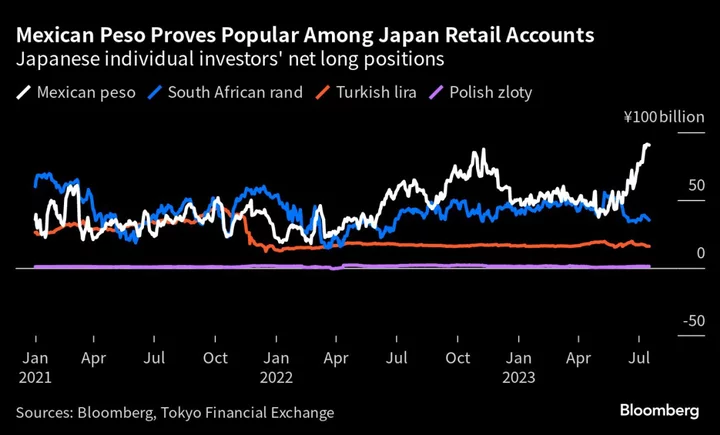Japanese retail investors — who dominate spot trading in Tokyo’s foreign-exchange market — have increased bets on volatile currencies despite the rising risk of a monetary policy shift at home this year.
Net long positions of individual account holders in four currencies favored by these investors, including the Mexican peso and the South African rand, have increased to ¥147 billion ($1 billion), a Bloomberg analysis of July figures from Tokyo Financial Exchange Inc. shows. That’s the highest in more than two years.
While the amount is modest relative to daily global foreign-exchange turnover of $7.5 trillion, it indicates that the prospect of higher interest rates in Japan won’t deter popular carry trades made from Tokyo. These involve selling the low-yielding yen to buy high-yielding currencies and often trigger sharp moves in forex markets when they go wrong and have to be quickly unwound.
Read more: Japan’s Margin Traders: Why They Matter for Currency Markets
Inflation in Japan and around the world is piling pressure on the central bank to adjust its yield-curve control policy. The likelihood of a move this week appears to be falling, with economists forecasting that the Bank of Japan will stand pat on Friday. And Bloomberg reported last week that BOJ officials see little urgent need to address the side effects of its yield curve control program at this point.
Yet an increasing number of economists see change as possible in September or October, which would likely nudge Japanese interest rates and the yen higher.
A policy adjustment would probably trigger stop-loss selling by retail traders, but only temporarily, said Tetsuya Yamaguchi, chief technical analyst at Fujitomi Securities Co. in Tokyo. Some of them would actually take this as an opportunity to put on more trades, he said, noting that very low rates on deposit accounts in Japanese banks would continue to push investors to search for higher-yielding options.
Net longs in Mexico’s peso, which is the most popular emerging-market currency with Japanese retail investors in publicly available data from Tokyo Financial Exchange, reached a record high this month in figures going back to 2017. The rand, the Polish zloty and the Turkish lira are the three other currencies covered by the Bloomberg analysis.
A combination of long positions in the four currencies, paired with a short position in the yen, has gained about 35% since the end of 2021, according to data compiled by Bloomberg. Interest rates accounted for 29 percentage points of the gain.
“As real income has declined due to inflationary pressure at home, there’s no option but to look at overseas,” said Toru Nishihama, chief emerging-market economist at Dai-ichi Life Research Institute.
Retail investors account for about 88% of the volume of currency spot trading in Tokyo, according to the most recent survey conducted each April by the Financial Futures Association of Japan and the Tokyo Foreign Exchange Market Committee and released in October.
Japanese account for 28% of world retail currency trading, the BOJ said in a recent research paper, citing data from the Bank for International Settlements.

